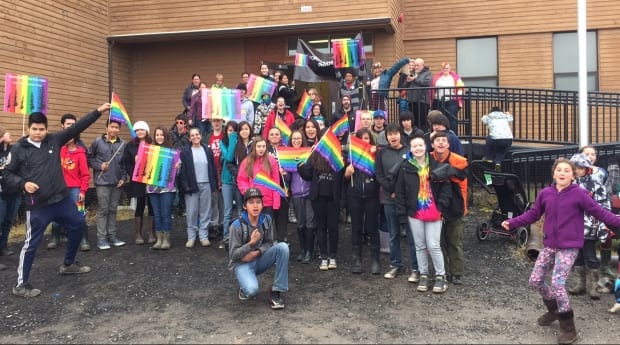There was a time when being queer in Norman Wells, Northwest Territories was among the most isolating experiences in Canada.
The town of about 700 people is located just one degree south of the Arctic Circle and can only be accessed by air or boat until winter, when an ice road forms over the MacKenzie River.
From the outside, it has a conservative character — an oil and gas town in the heart of the Canadian north — but looks can be deceiving. Today, being queer is celebrated in Norman Wells, as evidenced by the community’s inaugural Pride parade held just before the first snowfalls of September 2015.
Hosted by the teachers and staff of MacKenzie Mountain School, Norman Wells saw the entire student body march through town accompanied by community members and municipal representatives, waving rainbow flags and blasting songs like Lady Gaga’s “Born This Way” and Diana Ross’ “I’m Coming Out.”
For 15-year-old Stevie Deschene, who identifies as bisexual, events like the Pride parade (and the week of school activities leading up to it) have affirmed there is a place for people like her in Norman Wells.
“I think it’s pretty good the way we have it,” she tells Daily Xtra.
Like most teenagers in “The Wells,” Deschene enjoys skidooing and hanging out at the youth centre, and she performs in school plays. She’s also one of a growing number of young people coming out of the closet.
“I probably only have two straight friends,” she says. “They’re not all as out as I am, but there are a lot of us.”
According to Deschene, Rainbow United (the school’s year-old gay-straight alliance) has played an important role in helping students feel safe opening up about their sexuality or gender identity.
“I saw that the phrase ‘That’s so gay’ wasn’t used as much because we put posters all over the school explaining why that phrase shouldn’t be used,” she says.
The school’s principal, Michael Duclos, gave Pride Week his full support when it was first proposed.
“The whole intent of the week was trying to educate the school and the community and I guess the greater Northwest Territories that love is love, no matter if you love a boy or a girl,” he says.
Some parents were hesitant about the idea, but Duclos says that after explaining to them the events were about promoting tolerance “they were a little more on board.” There were some questions, too, about whether a public school would be an appropriate venue to be having these discussions.
“It’s really important because you hear in the news all the time in a lot bigger centres that suicide is a real thing for teens who feel that they aren’t able to identify and be themselves,” he says.
Sarah Kelly, the teacher who spearheaded the formation of MacKenzie Mountain School’s gay-straight alliance last year and organized Pride Week, admits there was some pushback but not nearly as much as she was anticipating.
“It’s not just a sewing club; you’re going to have people who are a little confrontational,” she says. “But that’s why you have to have it. ”
Kelly says she would love to work with other schools interested in hosting similar events but because many communities in the region are only accessible by air, it’s just not feasible for her.
“I wish that I could just get in my car and drive 30 minutes to the next town and lead a workshop with staff and kind of keep going but it would costs thousands and thousands of dollars to do that in the NWT.”
Deschene echoes her teacher’s desire to spread information to other parts of the north.
“Because we’re so isolated, the message hasn’t really gotten through that it’s normal now and the world is changing,” she says, adding that she hopes more young people who are out like her can help to educate others.
“I’ve done that,” she says. “I actually made a chart of ‘LGBT’ for my parents so they would understand.”

 Why you can trust Xtra
Why you can trust Xtra


